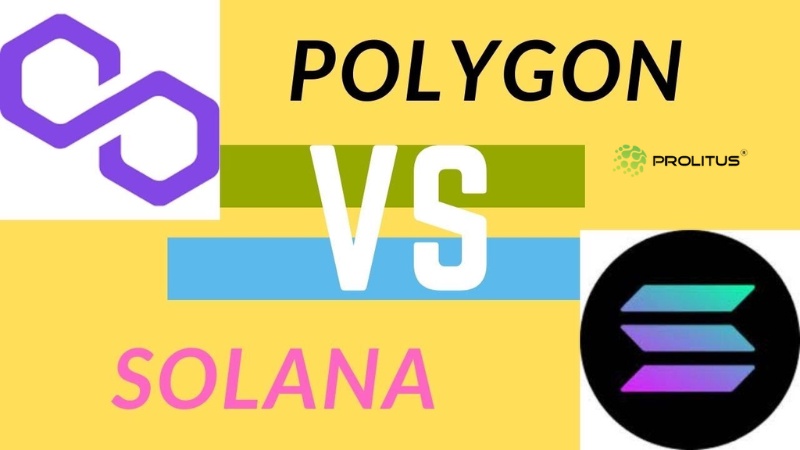Blockchain technology has ushered in a new era of decentralization and innovation, with a multitude of blockchains available for various use cases. Two prominent players in this space are Polygon and Solana. Both platforms offer unique features and capabilities, making the choice between them a crucial decision for any project. In this article, we'll delve into the intricacies of Polygon and Solana, helping you make an informed choice for your project's needs.
Understanding Polygon: Scaling Ethereum's Horizons
Polygon, formerly known as Matic Network, aims to enhance Ethereum's scalability and user experience. It does this by providing a framework for building Ethereum-compatible blockchains, also known as sidechains, that offer faster transactions and lower fees. One of Polygon's notable features is its commitment to interoperability – the ability to seamlessly interact with the Ethereum network. This makes it an attractive option for projects seeking to leverage Ethereum's vast ecosystem while overcoming its scalability limitations.
Advantages of Polygon:
-
Scalability: Polygon's architecture allows it to process thousands of transactions per second, making it an efficient choice for projects with high transaction volumes.
-
Ethereum Compatibility: Being Ethereum-compatible, Polygon offers developers a familiar development environment, allowing them to port their Ethereum-based applications with ease.
-
Interoperability: Polygon's commitment to interoperability means that applications built on its network can interact with Ethereum smart contracts and assets without friction.
-
Security: Polygon benefits from Ethereum's security model and consensus mechanism, enhancing the overall security of the platform.
Use Cases for Polygon:
-
Decentralized Finance (DeFi): Polygon's scalability and compatibility make it an excellent choice for DeFi projects that require fast and cost-effective transactions.
-
Non-Fungible Tokens (NFTs): NFT platforms can benefit from Polygon's reduced fees and faster confirmation times, enhancing the user experience.
-
Gaming: Gaming platforms that rely on quick and seamless transactions can leverage Polygon's high throughput.
Exploring Solana: Web-Scale Decentralization
Solana stands out as a high-performance blockchain designed to handle complex applications and process transactions at lightning speed. Its unique consensus mechanism, Proof of History (PoH), enhances its scalability and efficiency, making it suitable for applications that demand near-instant confirmation times and high throughput.
Advantages of Solana:
-
Transaction Speed: Solana's PoH technology enables fast transaction processing, with block times of a few seconds, and the potential to handle 65,000 transactions per second.
-
Scalability: Solana's architecture is built for scalability from the ground up, allowing it to handle demanding workloads without sacrificing performance.
-
Low Costs: Despite its high throughput, Solana maintains relatively low transaction costs, appealing to projects aiming for affordability.
-
Developer-Friendly: Solana offers a comprehensive suite of developer tools and resources, facilitating the creation of complex decentralized applications.
Use Cases for Solana:
-
Decentralized Exchanges (DEXs): Solana's speed and scalability make it an ideal platform for DEXs, enabling real-time trading experiences.
-
High-Frequency DeFi: Projects that require frequent and rapid interactions with smart contracts, such as algorithmic trading platforms, can benefit from Solana's fast confirmation times.
-
Real-World Data Applications: Solana's performance makes it suitable for applications that rely on real-world data feeds, like prediction markets and supply chain tracking.
Choosing the Right Fit for Your Project:
While both Polygon and Solana offer impressive features, the choice between them depends on the specific requirements of your project:
-
Consider Scalability Needs: If your project demands massive scalability, Solana's higher throughput might be the solution. However, if you seek a balance between scalability and compatibility with Ethereum, Polygon might be more suitable.
-
Transaction Speed and Costs: If your project requires near-instant transaction confirmation and low costs, Solana's PoH mechanism could be the answer. On the other hand, if you need Ethereum interoperability and relatively lower fees, Polygon is worth considering.
-
Ecosystem and Development: Evaluate the developer tools, community support, and existing ecosystem of each platform. Both Polygon and Solana have thriving communities, but your familiarity and comfort with the development environment are crucial.
In conclusion, the decision between Polygon and Solana hinges on the specific needs of your project. Polygon excels in offering Ethereum compatibility and enhanced interoperability, making it a compelling choice for projects seeking to tap into Ethereum's ecosystem. Solana, with its blazing-fast transaction speeds and scalability, caters to projects that require high-performance capabilities. Carefully analyzing your project's requirements and aligning them with the strengths of each platform will guide you toward making the optimal choice for your blockchain endeavor.


No comments yet